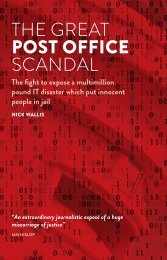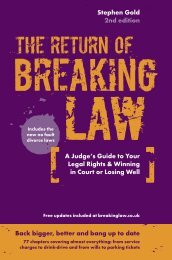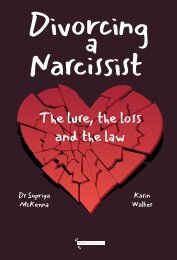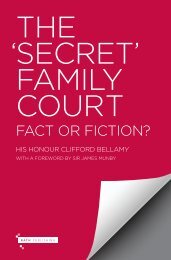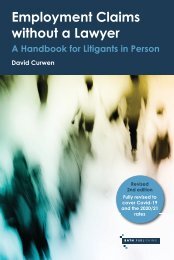Insolvency Made Clear: A Guide for Debtors
Plain English, practical guidance for anyone facing demands over a debt they are struggling to pay.
Plain English, practical guidance for anyone facing demands over a debt they are struggling to pay.
Create successful ePaper yourself
Turn your PDF publications into a flip-book with our unique Google optimized e-Paper software.
Legal Terms Defined<br />
a bankruptcy order is made, but a private <strong>Insolvency</strong> Practitioner can replace<br />
them if the creditors wish.<br />
An ‘order’ is when the court requires something to happen or not happen.<br />
A ‘party’ to a claim is someone who participates in that claim. For example, the<br />
debtor and petitioning creditor are parties to a bankruptcy petition.<br />
The ‘PDIP’ is the ‘Practice Direction - <strong>Insolvency</strong> Proceedings’. This <strong>for</strong>ms part<br />
of the procedural rules which the court will follow. It can be found at https://<br />
www.justice.gov.uk/courts/procedure-rules/civil/rules/insolvency_pdf.<br />
A ‘personal representative’ is in charge of the estate of someone who has died.<br />
‘Personal service’ means that a document must be physically handed to its<br />
addressee, as opposed to posted or sent by email. If personal service is not<br />
possible, the court may permit ‘alternative’ or ‘substituted’ service – typically<br />
service by post.<br />
A ‘petition’ is a request <strong>for</strong> the court. In this book, it refers to a request to bankrupt<br />
someone, except in Chapter 12 where a winding up petition is to put a company<br />
into liquidation. When the request is submitted to the court, the petition<br />
is said to be ‘presented’.<br />
The ‘petitioning creditor’ is the creditor who brings a petition, as opposed to<br />
any other creditor who might support or oppose the petition, or not be involved<br />
at all.<br />
A ‘privileged’ document is one which does not need to be disclosed to the other<br />
side of a dispute. Legal advice is usually privileged, and so is a document which<br />
is sent ‘without prejudice’.<br />
‘Pro bono’ legal advice is legal advice given <strong>for</strong> free.<br />
‘Proceedings’ is shorthand <strong>for</strong> ‘the court process when a claim is made’.<br />
A ‘process server’ is someone whose job is to serve documents, i.e. to deliver<br />
court documents to individuals. They are frequently used when a document<br />
requires personal service.<br />
‘Property’ means something similar to ‘an asset’. It refers to someone’s possessions.<br />
Property does not need to be land (this is known as ‘real property’). For<br />
example, a car is a type of property.<br />
xxv






